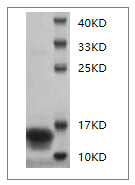Mouse IFN-γ protein, His Tag
Catalogue Number: PRP1015-ABK
| Manufacturer: | Abbkine |
| Molecular Weight: | 16.9 kda |
| Physical state: | Lyophilized |
| Type: | Interferons |
| Alias: | IFG|IFI|IFN gamma|IFNG|Interferon Gamma |
| Host Cell: | E.coli |
| Shipping Condition: | RT |
| Unit(s): | 1 mg, 100 ug, 20 ug, 500 ug |
Description
Description: IFN-γ, also known as IFNG, is a secreted protein which belongs to the type I I interferon family. IFN-γ is produced predominantly by natural killer and natural killer T cells as part of the innate immune response, and by CD4 and CD8 cytotoxic T lymphocyte effector T cells once antigen-specific immunity develops. IFN-γ has antiviral, immunoregulatory, and anti-tumor properties. IFNG, in addition to having antiviral activity, has important immunoregulatory functions, it is a potent activator of macrophages, and has antiproliferative effects on transformed cells and it can potentiate the antiviral and antitumor effects of the type I interferons. The IFNG monomer consists of a core of six α-helices and an extended unfolded sequence in the C-terminal region. IFN-γ is critical for innate and adaptive immunity against viral and intracellular bacterial infections and for tumor control. Aberrant IFN-γ expression is associated with a number of autoinflammatory and autoimmune diseases. The importance of IFN-γ in the immune system stems in part from its ability to inhibit viral replication directly, and most importantly from its immunostimulatory and immunomodulatory effects. IFNG also promotes NK cell activity.
Additional Text
Gene Name
IFNG
Uniprot ID
P01580
Gene ID
15978
Protein Tag
HIS Tag
Short Description
Mouse IFN-γ protein, His Tag, expressed in E. coli
Note
Always centrifuge tubes before opening. It is recommended to reconstitute the lyophilized Mouse IFN-gamma protein in sterile ddH2O not less than 100µg/ml, which can then be further diluted to other aqueous solutions.
